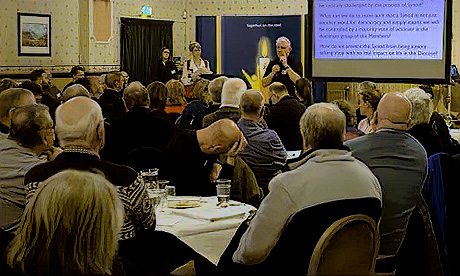The process for identifying issues to be discussed at the 2023 global Synod of bishops will stifle lay Catholic voices all over the world, a group of lay Catholics in the UK says.
The group is speaking out as they organise an upcoming lay-led diocesan synod. The synod’s aim is to feed ideas to bishops to take to a global synod of bishops in October 2023.
The group is particularly concerned topics to go to the global synod will be limited to those discerned by the bishops. They say even though the laity can suggest ideas, they won’t have any real say in choosing which ones the bishops take with them. The process as it has been devised will prevent discussion, participation and freedom for everyone except the hierarchy, they say.
While all members of the Church have the right to speak, particularly at the diocesan-level listening exercise, they also have “the obligation to allow those charged with the work of discernment the freedom to do so.
“In one stroke, the freedom to speak is nullified. Of what use is such freedom to a parishioner, if her or his ability to be heard is instantly trumped by the bishop’s authority – or ‘discernment’ – to disallow it?
“Many of us had high hopes for Pope Francis’ announcement on synodality. Sadly, the experience of the Liverpool Synod, and of the ongoing Australian Plenary, amongst others, suggests that the laity may as well save their breath to cool their porridge.”
“Just as the Liverpool Synod declared itself unable to consider the issues which most exercised its people, so this global Synod seems to be confining itself to the safe topics of formation and mission, and the ever-safe pronouncements that all can agree upon: refugees, asylum-seekers and the poor.
“We are left to ask – what does Communion truly mean, when we all of us know good fellow-parishioners who have not taken Communion for decades because they are not married to their current partner, have left an abusive marriage, or simply quailed at the labyrinthine processes of annulment?
“What does participation mean, when our children leave at the first opportunity? Why .., would we free, democratic members of our own country, urge rational … fellow-beings to join a Church where they instantly lose all voice and all governance?”
The synod’s success is essential, says Frank Callus of lay Catholic group Call to Action
He says the bishops’ guidance is “limited” and needs greater clarity, particularly around how the “listening” process will operate.
While religious practice normally evolves slowly, he says these times are far from normal. The pandemic has closed churches, interrupted liturgical services and caused profound anguish to people of faith and people of none.
A consistent approach to listening would help.
“It is not as if we had no model to follow.” The Liverpool synod is one such model. It successfully engaged numerous clergy and laity and produced a series of proposals,” he says.
Pope Francis has challenged dioceses to discern their future by listening deeply to all the voices.
Source
